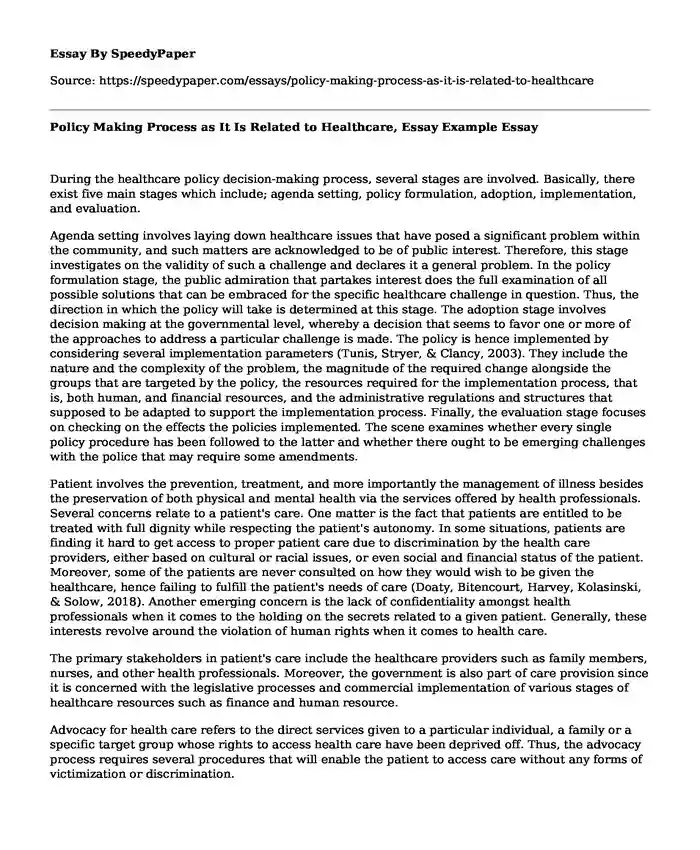
| Type of paper: | Essay |
| Categories: | Healthcare policy |
| Pages: | 3 |
| Wordcount: | 741 words |
During the healthcare policy decision-making process, several stages are involved. Basically, there exist five main stages which include; agenda setting, policy formulation, adoption, implementation, and evaluation.
Agenda setting involves laying down healthcare issues that have posed a significant problem within the community, and such matters are acknowledged to be of public interest. Therefore, this stage investigates on the validity of such a challenge and declares it a general problem. In the policy formulation stage, the public admiration that partakes interest does the full examination of all possible solutions that can be embraced for the specific healthcare challenge in question. Thus, the direction in which the policy will take is determined at this stage. The adoption stage involves decision making at the governmental level, whereby a decision that seems to favor one or more of the approaches to address a particular challenge is made. The policy is hence implemented by considering several implementation parameters (Tunis, Stryer, & Clancy, 2003). They include the nature and the complexity of the problem, the magnitude of the required change alongside the groups that are targeted by the policy, the resources required for the implementation process, that is, both human, and financial resources, and the administrative regulations and structures that supposed to be adapted to support the implementation process. Finally, the evaluation stage focuses on checking on the effects the policies implemented. The scene examines whether every single policy procedure has been followed to the latter and whether there ought to be emerging challenges with the police that may require some amendments.
Patient involves the prevention, treatment, and more importantly the management of illness besides the preservation of both physical and mental health via the services offered by health professionals. Several concerns relate to a patient's care. One matter is the fact that patients are entitled to be treated with full dignity while respecting the patient's autonomy. In some situations, patients are finding it hard to get access to proper patient care due to discrimination by the health care providers, either based on cultural or racial issues, or even social and financial status of the patient. Moreover, some of the patients are never consulted on how they would wish to be given the healthcare, hence failing to fulfill the patient's needs of care (Doaty, Bitencourt, Harvey, Kolasinski, & Solow, 2018). Another emerging concern is the lack of confidentiality amongst health professionals when it comes to the holding on the secrets related to a given patient. Generally, these interests revolve around the violation of human rights when it comes to health care.
The primary stakeholders in patient's care include the healthcare providers such as family members, nurses, and other health professionals. Moreover, the government is also part of care provision since it is concerned with the legislative processes and commercial implementation of various stages of healthcare resources such as finance and human resource.
Advocacy for health care refers to the direct services given to a particular individual, a family or a specific target group whose rights to access health care have been deprived off. Thus, the advocacy process requires several procedures that will enable the patient to access care without any forms of victimization or discrimination.
The process of advocacy involves several steps that make it entirely procedural. Firstly, is the identification of the issue of concern, and investigate the legislative measures it can take. Secondly, is the listing of the facts that have been identified to work appropriately as critical points for the advocacy process. Thirdly, the advocate needs to build support from a wider area of the concerned community, by involving several leaders who influential enough and draw them to support your position (Miller, Lewis, & Waites, 2018). The fourth step consists of the advocate identifying opposing individuals or organizations. The fifth point involves a keen understanding of the legislative process that the advocacy will go through. Finally, it is advisable to include the media to magnify the issue and draw close a full range of supportive groups for one to emerge victorious in the whole advocacy process.
References
Tunis, S. R., Stryer, D. B., & Clancy, C. M. (2003). Practical clinical trials: increasing the value of clinical research for decision making in clinical and health policy. Jama, 290(12), 1624-1632.
Miller, A. P., Lewis, S., & Waites, T. (2018). Essentials of Advocacy: What Is Behind the Curtain?.
Doaty, S., Bitencourt, N., Harvey, W., Kolasinski, S., & Solow, E. B. (2018). Advocacy 101: Engaging Rheumatology Fellows in Health Policy and Advocacy. Arthritis care & research.
Cite this page
Policy Making Process as It Is Related to Healthcare, Essay Example. (2022, Feb 23). Retrieved from https://speedypaper.com/essays/policy-making-process-as-it-is-related-to-healthcare
Request Removal
If you are the original author of this essay and no longer wish to have it published on the SpeedyPaper website, please click below to request its removal:
- Daddy by Sylvia Plath - Essay Sample with Poem Analysis
- Essay Example: What Is Osteoporosis and Why Does It Occur
- Free Essay on Involvement Teaching Method
- Interview with a Youth Worker. Free Essay for You.
- Free Essay Example: Ethical Concerns in Human Services
- Jesus' Death and Resurrection: The Ultimate Sacrifice. Paper Sample
- Essay Example on Well Completion Report Summary
Popular categories




